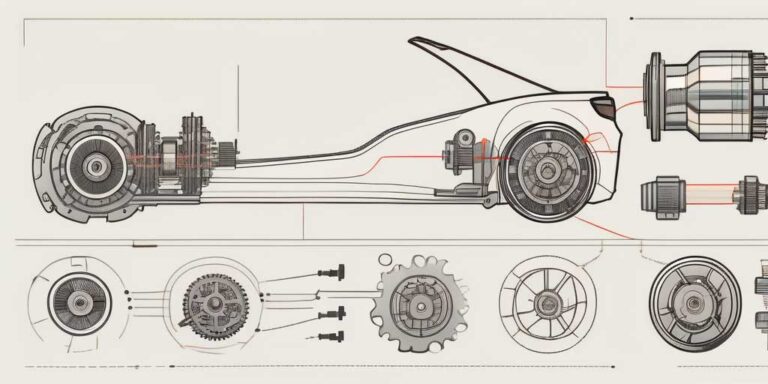
Understanding the Symptoms of Transmission and Drivetrain Failures
Welcome to our comprehensive guide on understanding the symptoms of transmission and drivetrain failures. Whether you’re a seasoned car owner or a new driver, recognising the signs of potential issues with your vehicle’s transmission and drivetrain is crucial for maintaining its optimal performance and ensuring your safety on the road.
Common Symptoms of Transmission Issues
The transmission is a vital component of your vehicle, which transfers power from the engine to the wheels. Therefore, any malfunction in the transmission can lead to many problems. Here are some common symptoms to watch out for:
- Transmission slipping: You may feel a delay in acceleration or the engine revving without the vehicle responding accordingly.
- Strange noises: Unusual noises such as grinding, whining, or clunking can indicate a transmission problem.
- Fluid leaks: If you notice spots or pools of fluid under your car, it could be a sign of a transmission fluid leak.
- Burning smell: Smelling something burning, particularly a sweet or acrid odour, may signal overheating transmission fluid.
- Warning lights: Pay attention to any warning lights on your dashboard, especially the Check Engine light.
It’s essential to address transmission issues as soon as possible to prevent further damage to your vehicle. Ignoring these symptoms can lead to costly repairs down the line. In addition to the mentioned signs, another indication of transmission problems is a delay in shifting gears. If you experience a delay or hesitation when changing gears, it could point to internal transmission issues that need to be inspected by a professional mechanic.
Rough shifting or jerking movements while driving can also be attributed to transmission problems. This can manifest as a harsh transition between gears or a noticeable jolt when shifting. These symptoms affect the driving experience and can indicate underlying issues within the transmission system that require attention. Regular maintenance and timely servicing can help prevent these issues and ensure the longevity of your vehicle’s transmission.
Signs of Drivetrain Problems to Watch for
The drivetrain, which consists of the transmission, driveshaft, differential, and axles, transfers power to the wheels. Here are some signs that may indicate drivetrain difficulties:
- Difficulty shifting gears: If you experience grinding, popping out of gear, or difficulty shifting, it could be a problem with the drivetrain.
- Clunking or clicking noise: Unusual noises during acceleration or deceleration can indicate worn or damaged drivetrain components.
- Vibrations: Excessive vibrations, especially at high speeds, may indicate an issue with the drivetrain system.
- Uneven tyre wear: If your tyres show uneven wear patterns, it could result from drivetrain problems.
Addressing drivetrain issues quickly can prevent further damage to your vehicle. Ignoring these warning signs can lead to more extensive and costly repairs. If you notice any of the symptoms mentioned above, it is recommended that you have your drivetrain system inspected by a qualified mechanic.
Regular drivetrain maintenance can also help prolong its lifespan and ensure optimal performance. This includes checking and replacing transmission fluid, inspecting the driveshaft and axle boots for damage, and properly lubricating the differential. By staying proactive with drivetrain maintenance, you can avoid unexpected breakdowns and maintain the efficiency of your vehicle’s power delivery system.
The Role of Regular Maintenance in Preventing Transmission Failures
I think maintaining your transmission and drivetrain through regular inspections and servicing is essential. By taking proactive measures, you can prevent potential failures and extend the lifespan of these crucial components. Here are some maintenance tips to follow:
- Regular fluid checks and changes: Ensure the transmission fluid is at the correct level and replace it according to the manufacturer’s recommendations.
- Inspecting for leaks: Periodically check for fluid leaks and promptly address them to avoid further damage.
- Checking the drivetrain components: Inspect the driveshaft, differential, and axles for signs of wear or damage and address any issues promptly.
- Following the manufacturer’s maintenance schedule: Adhere to the recommended maintenance intervals outlined in your vehicle’s owner’s manual.
Regular maintenance ensures the smooth operation of your vehicle’s transmission and contributes to improved fuel efficiency and overall performance. By keeping your transmission in optimal condition, you can avoid costly repairs and breakdowns that may leave you stranded on the road. In addition to the maintenance tips mentioned, it is also crucial to pay attention to the transmission’s cooling system.
Overheating can cause significant damage to the transmission components, leading to failures. Please ensure the transmission cooler is functioning correctly and the cooling lines are free from obstructions. Regularly inspecting and cleaning the transmission cooler can help prevent overheating issues and prolong the lifespan of your transmission. A well-maintained transmission is critical to a reliable and enjoyable driving experience.
Tips for Extending the Lifespan of Your Transmission and Drivetrain
In addition to regular maintenance, here are some tips to help you extend the lifespan of your transmission and drivetrain:
- Drive smoothly: Avoid sudden and aggressive acceleration or braking, as it can strain your transmission and drivetrain.
- Allow warm-up time: Give your vehicle a few minutes to warm up before driving off to ensure proper lubrication of the components.
- Avoid excessive loads: Overloading your vehicle can unnecessarily strain the transmission and drivetrain.
- Use the correct transmission fluid: Always use the manufacturer-recommended transmission fluid to optimise performance and longevity.
Also, please pay attention to any unusual sounds or vibrations coming from your transmission or drivetrain. These can be early indicators of potential issues that, if addressed promptly, can prevent more significant problems. Regularly checking the fluid levels and condition in your transmission and differential can also help ensure they are properly lubricated and functioning optimally.
Another crucial aspect of maintaining your transmission and drivetrain is to follow the recommended service intervals outlined in your vehicle’s owner’s manual. These intervals typically include tasks such as fluid changes, filter replacements, and inspections that are vital to the health of your transmission and drivetrain. By staying on top of these maintenance tasks, you can help prolong the lifespan of these critical components and avoid costly repairs in the future.
Seeking Professional Help: When to Consult a Mechanic for Transmission and Drivetrain Issues
While regular maintenance goes a long way in preventing problems, there may be instances when you need to consult a professional mechanic. Consider seeking expert help if you experience any of the following:
- Severe transmission slipping: If your transmission slips consistently and significantly affects your vehicle’s performance, it’s time to consult a mechanic.
- Unusual noises persist: Strange noises that continue or worsen despite regular maintenance may indicate underlying issues that require professional attention.
- Warning lights appear: When warning lights related to the transmission or drivetrain system illuminate, they must be inspected promptly.
- Fluid leaks are substantial: Large and persistent fluid leaks require immediate attention from a mechanic to prevent further damage.
We hope this comprehensive guide has helped you understand the symptoms of transmission and drivetrain failures. By staying vigilant, practising regular maintenance, and seeking professional help, you can ensure the longevity and reliability of your vehicle’s transmission and drivetrain system. Stay safe on the road!
Need Help?
Don’t let transmission troubles slow you down! From regular servicing to extensive transmission repair, Kadotani Auto Repair, your AAA-approved go-to expert in Watsonville, CA, is here to help.
Trust your vehicle with professionals who understand the importance of keeping you safely on the road. Visit us at 1865 Main St, Watsonville, CA 95076, or call us at 831-728-4212 to schedule your appointment. Our doors are open Monday through Friday, 8:00 am to 5:00 pm, ensuring we’re here when you need us most. Remember, we’re closed on Saturdays and Sundays, so plan your visit during our operating hours.
Drive with confidence, knowing Kadotani Auto Repair has your back!


